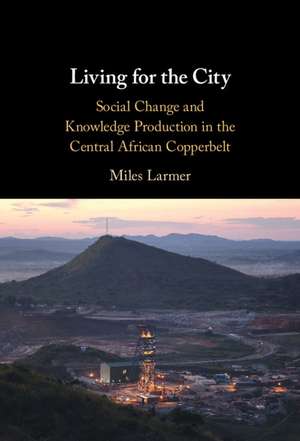Living for the City: Social Change and Knowledge Production in the Central African Copperbelt
Autor Miles Larmeren Limba Engleză Hardback – 11 aug 2021
| Toate formatele și edițiile | Preț | Express |
|---|---|---|
| Paperback (1) | 232.10 lei 3-5 săpt. | +22.09 lei 6-12 zile |
| Cambridge University Press – 20 iun 2024 | 232.10 lei 3-5 săpt. | +22.09 lei 6-12 zile |
| Hardback (1) | 700.92 lei 6-8 săpt. | |
| Cambridge University Press – 11 aug 2021 | 700.92 lei 6-8 săpt. |
Preț: 700.92 lei
Preț vechi: 787.55 lei
-11% Nou
Puncte Express: 1051
Preț estimativ în valută:
134.13€ • 143.42$ • 111.83£
134.13€ • 143.42$ • 111.83£
Carte tipărită la comandă
Livrare economică 18 aprilie-02 mai
Preluare comenzi: 021 569.72.76
Specificații
ISBN-13: 9781108833158
ISBN-10: 1108833152
Pagini: 288
Dimensiuni: 157 x 235 x 28 mm
Greutate: 0.7 kg
Editura: Cambridge University Press
Colecția Cambridge University Press
Locul publicării:Cambridge, United Kingdom
ISBN-10: 1108833152
Pagini: 288
Dimensiuni: 157 x 235 x 28 mm
Greutate: 0.7 kg
Editura: Cambridge University Press
Colecția Cambridge University Press
Locul publicării:Cambridge, United Kingdom
Cuprins
Introduction; 1. Imagining the Copperbelts; 2. Boom Time – Revisiting Capital and Labour in the Copperbelt; 3. Space, Segregation and Socialisation; 4. Political Activism, Organisation and Change in the Late Colonial Copperbelt; 5. Gendering the Copperbelt; 6. Nationalism and Nationalisation; 7. Copperbelt cultures from the Kalela Dance to the Beautiful Time; 8. Decline and Fall: Crisis and the Copperbelt, 1975-2000; 9. Remaking the Land: Environmental Change in the Copperbelt's history, present and future; Conclusion.
Recenzii
'This is a superb book, a model for combining social history with the history of knowledge production. It not only offers fresh perspectives on the Central African Copperbelt, but sets an example for a better understanding and a nuanced interpretation of broader transformations in Africa since the 1950s.' Andreas Eckert, Humboldt University Berlin
'This book helps us see the central African Copperbelt in a new light. Company towns were fulcrums for new forms of thought, engines for the creation of new kinds of culture, incubators for new literary projects, forcing-houses for new kinds of politics. Grounded on research in a wide range of archives, and drawing from oral interviews in Zambia and the Congo, Miles Larmer's impressive book gives labor history new dimensions, helping us glimpse the intellectual worlds where miners lived.' Derek Peterson, University of Michigan
'… an excellent book, that is innovative in its border-crossing approach of the Central African Copperbelt, in its combination of social and intellectual history, and in its incisive critique of mining industry, during and after colonial rule.' Geert Castryck, H-Soz-Kult
'This book helps us see the central African Copperbelt in a new light. Company towns were fulcrums for new forms of thought, engines for the creation of new kinds of culture, incubators for new literary projects, forcing-houses for new kinds of politics. Grounded on research in a wide range of archives, and drawing from oral interviews in Zambia and the Congo, Miles Larmer's impressive book gives labor history new dimensions, helping us glimpse the intellectual worlds where miners lived.' Derek Peterson, University of Michigan
'… an excellent book, that is innovative in its border-crossing approach of the Central African Copperbelt, in its combination of social and intellectual history, and in its incisive critique of mining industry, during and after colonial rule.' Geert Castryck, H-Soz-Kult
Notă biografică
Descriere
A history of the cross-border Central African copperbelt, integrating the region's social history with knowledge production about it.
